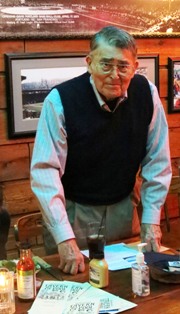Future Now
The IFTF Blog
IFTF Remembers Robert B. Textor, Anticipatory Anthropologist
Last week the originator of anticipatory anthropology passed away, peacefully. He was 89 years old.
From 1976 and throughout the 1980s and 1990s Dr. Robert Bayard Textor created and championed ethnographic futures research (EFR), http://peacecorpsworldwide.org/babbles/2013/01/04/dr/ a rigorous methodology for bringing the insights of cultural anthropology to futures research, and conversely bringing foresight into the discipline of anthropology. While he was developing it he co-taught a seminar on cultural futures research at Stanford with our own Bob Johansen in the late 1970s.
http://peacecorpsworldwide.org/babbles/2013/01/04/dr/ a rigorous methodology for bringing the insights of cultural anthropology to futures research, and conversely bringing foresight into the discipline of anthropology. While he was developing it he co-taught a seminar on cultural futures research at Stanford with our own Bob Johansen in the late 1970s.
“EFR is intended as a research and learning tool by which an individual can actively cultivate the art of anticipation.” (Textor 1995)
Dr. Textor’s insight about the connection between research and learning resonates strongly with IFTF’s founding purpose to promote futures thinking through systematic consideration of future possibilities. As a methodology, EFR fuses in-depth interviewing and scenario creation to study people’s ideas about the future, their values, and their concepts of change.
It remains the underlying basis for much of my work and that of my fellow ethnographers at the Institute for the Future. This legacy is obvious in our most explicitly ethnographic work, such as the BRIC Map of Local Lives in a Global Economy, and Boomers: The Next 20 Years. But a basic commitment to the idea that futures need to be seen from the perspective of people who will create and inhabit them is far more pervasive in our artifacts from the future and our more recent work in inclusive futures and conflict resolution. Just as Dr. Textor became engaged in futures through his observations of the Peace Corps, we recognize that building a space for local foresight creation around the world may lead to increased global peace and resilience.
What Dr. Textor’s work underscores is that the future is not merely an academic subject: foresight matters to people and communities. While asking individuals about the future reveals a lot of bias and is not the best at predicting events, it more importantly reveals the values and concepts of change that make the future a useful space for communities to transform themselves: to create the futures they collectively want.
Dr. Jan English-Lueck, my mother and a mentee of Dr. Textor’s who has worked extensively with the Institute, commented on his impact, “He brought a Buddhist sensibility to thinking about the future, detached and compassionate.” His wisdom and insight serves as a reminder to approach futures with empathy and humility, and to never underestimate their power.
Dr. Textor will be celebrated by his family and an active community of like-minded people working for peace. His vision to foster futures thinking lives on through the AAA Textor Family Prize for Excellence in Anticipatory Anthropology.



